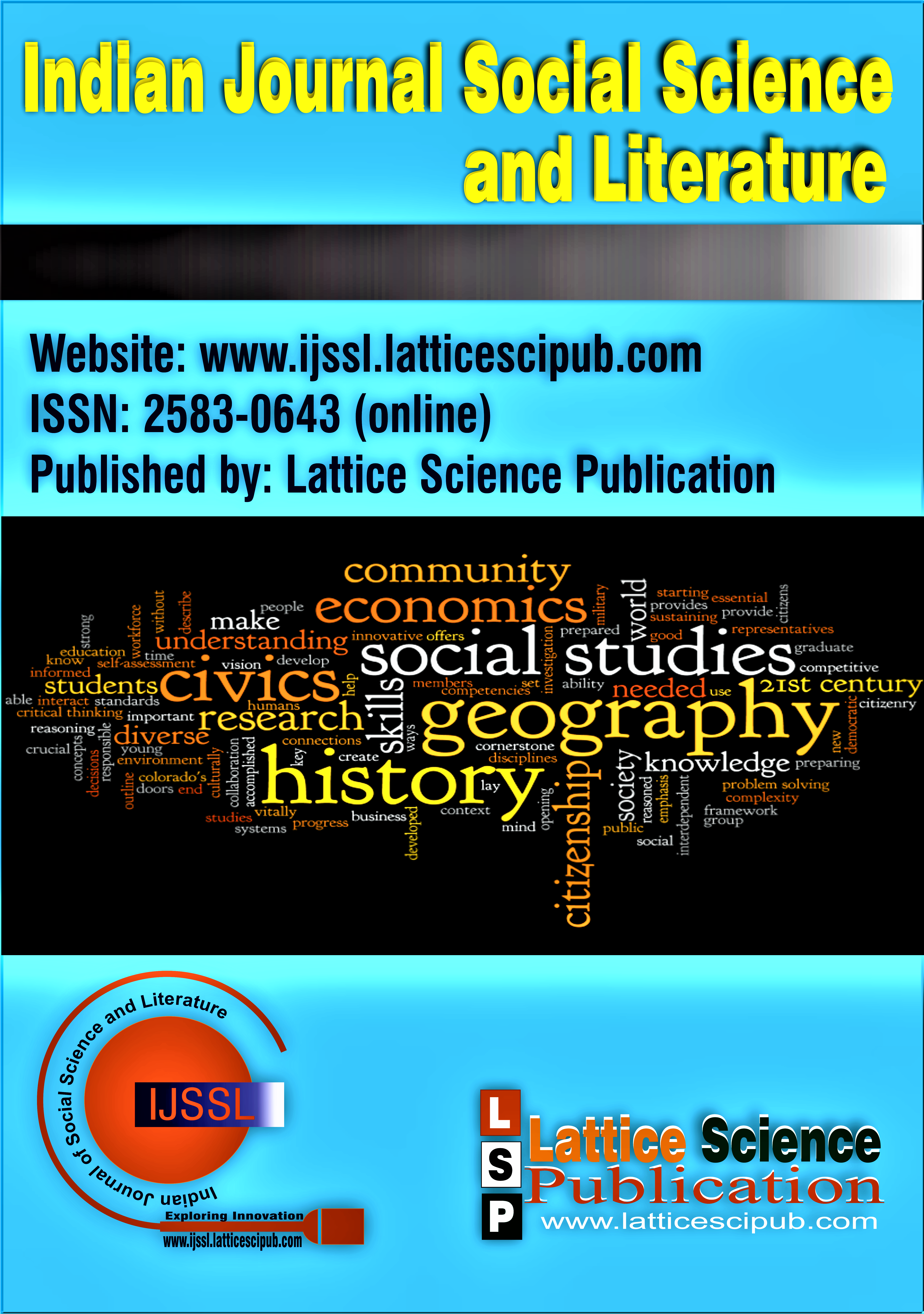A Veteran-Poet Trauma: US – Iraq War in Brian Turner's Poems Ashbah and Illumination Rounds
Main Article Content
Abstract
The present study investigates the notion of trauma as a result of the US-Iraqi War in Brian Turner's poems "Ashbah" and "Illumination Rounds". As a soldier-poet, Turner's poems portray an exceptional standpoint on the mental and emotional outcome of war owing to the examination of such themes as memory, language, and identity in his poetic verses. This article aims to discover the intricacies of trauma representation and the procedure of bearing witness to traumatic experiences in time of war. The study employs Cathy Caruth's theories of trauma and witnessing, as theorized in her two books Trauma: Explorations in Memory (1995) and Unclaimed Experience: Trauma, Narrative, and History (1996), to be the methodological tools for examining Brian Turner's poetry. In light of Cathy Caruth's theories of trauma and witnessing, and by thoroughly inspecting in Turner's usage of language, imagery, and narrative structure in his two poems, the findings demonstrate Turner's mental sufferings as a survivor of political violence. The two poems show the traumatic experiences he has lived with his friends through the US-Iraqi war enduring the effects of war. To conclude, depending on Caruth's notion of trauma, Turner's poetry depicts the lingering, vague nature of war experiences and the weighty impression they have on the mind. In addition, this article contextualizes Turner's poetic expressions in the wider socio-political setting of the US-Iraqi War, underscoring the durable heritage of war on both individual and shared memory.
Downloads
Article Details

This work is licensed under a Creative Commons Attribution-NonCommercial-NoDerivatives 4.0 International License.
How to Cite
References
Brink, D. (2012). Transversality and Imperial Affect: Situating Brian Turner's Phantom Noise. Parallax, 18(4), 42-53. https://doi.org/10.1080/13534645.2012.714552
Caruth, C. (Ed.). (1995). Trauma: Explorations in Memory. The John Hopkins University Press. https://hemisphericinstitute.org/images/courses/spring-2009/caruthintro.pdf
Caruth, C. (1996). Unclaimed Experience: Trauma, Narrative, and History. John Hopkins University Press. https://www.sas.upenn.edu/~cavitch/pdf-library/Caruth_Wound_and_Voice.pdf
Freud, S. (1939) Moses and Monotheism, Trans. Katherine Jones, London: Hogarth Press and the Institute of Psycho-Analysis. Print. https://wellcomecollection.org/works/v3w64yxt
Herman, J. L. (1992). Trauma and Recovery: The Aftermath of Violence--from Domestic Abuse to Political Terror. New York: Basic Books. https://libgen.li/ads.php?md5=EA6B91B28D3EC04DD551CDB950136B59
Higbee, D. (2015). Brian Turner's Here, Bullet and the Soldier-Poet Tradition. South Atlantic Review, 80(1-2), 115-132. https://www.jstor.org/stable/soutatlarevi.80.1-2.115
Jasim, M. A. (2024). War Poetry: A Comparative Study of Selected Poems in Saadi Youssef's and Brian Turner's Poetry. Central Asian Journal of Literature, Philosophy, and Culture, 5(4), 150-167. https://www.researchgate.net/publication/383838791_War_Poetry_A_Comparative_Study_of_Selected_Poems_in_Saadi_Youssef's_and_Brian_Turner's_Poetry
Koivisto, J. (2020). "Brian Turner’s Ghosts of War". Master’s Thesis. School of Marketing and Communication. University of Vaasa. https://osuva.uwasa.fi/bitstream/handle/10024/11351/UniVaasa_2020_Koivisto_Johanna.pdf?sequence=2&isAllowed=y
Luckhurst, R. (2008). The Trauma Question. New York: Routledge. Print. https://api.pageplace.de/preview/DT0400.9781136015021_A29481959/preview-9781136015021_A29481959.pdf
Mahmoud, S. (2016). "American Soldiers Against "the War on Terror": War Trauma in Selected Poems by Brian Turner". Journal of Scientific Research in Arts, 17(3), 1-32. DOI: https://doi.org/10.21608/jssa.2016.11347
Mariani, G. (2020). Against Embedded Literature: Brian Turner's Iraq War Poetry. Iperstoria, (16), 245-258. DOI: https://doi.org/10.13136/2281-4582/2020.i16.924
Pederson, J. (2014). Speak, Trauma: Toward a Revised Understanding of Literary Trauma Theory. Narrative, 22(3), 333–353. DOI: https://doi.org/10.1353/nar.2014.0018
Reisberg, D., & Hertel, P. (Eds.). (2004). Memory and Emotion. Oxford University Press. https://doi.org/10.1093/acprof:oso/9780195158564.001.0001
Rodi-Risberg, M. (2010). Writing Trauma, Writing Time and Space: Jane Smiley's A Thousand Acres and the Lear Group of Father-Daughter Incest Narratives. Phd Dissertation. University of Vaasa. https://www.uwasa.fi/materiaali/pdf/isbn_978-952-476-320-2.pdf
Schonfelder, C. (2013). Wounds and Words: Childhood and Family Trauma in Romantic and Postmodern Fiction. (Lettre). Bielefeld: transcript Verlag. https://doi.org/10.14361/transcript.9783839423783
Spalletta, G., Janiri, D., Piras, F., & Sani, G. (Eds.). (2020). Childhood Trauma in Mental Disorders: A Comprehensive Approach. Springer International Publishing. https://link.springer.com/book/10.1007/978-3-030-49414-8
Substance Abuse and Mental Health Services Administration. SAMHSA’s Concept of Trauma and Guidance for a Trauma-Informed Approach. HHS Publication No. (SMA) 14-4884. Rockville, MD: Substance Abuse and Mental Health Services Administration, 2014. https://ncsacw.acf.hhs.gov/userfiles/files/SAMHSA_Trauma.pdf
Sychterz, J. (2018). Poetry, the Iraq War, and the Ethics of Trauma. WLA; War, Literature, and the Arts, 30, (1), 1-17. https://link.gale.com/apps/doc/A571977658/AONE?u=anon~de3e4a75&sid=googleScholar&xid=ca540e39
Turner, B. (2005). Here, Bullet. Farmington, Me.: Alice James Books, Print. https://www.amazon.com/Here-Bullet-Brian-Turner/dp/1882295552
Turner, B. (2010). Phantom Noise. Farmington, Me.: Alice James Books, Print. https://www.amazon.com/Phantom-Noise-Brian-Turner/dp/1882295803
Vasile, C. (2014). An Analysis of Psychological Trauma Interventions. Procedia - Social and Behavioral Sciences, 127, 781–785. DOI: https://doi.org/10.1016/j.sbspro.2014.03.354
Willbern, D. (2017). Listening to Trauma: Conversations with Leaders in the Theory and Treatment of Catastrophic Experience by Cathy Caruth (review). American Imago, 74(2), 187-208. DOI: https://doi.org/10.1111/1745-8315.12482
C. Jothi, Trauma and Fluid Identity in Paul Auster’s Man in the Dark. (2020). In International Journal of Recent Technology and Engineering (Vol. 8, Issue 4S4, pp. 3–5). DOI: https://doi.org/10.35940/ijrte.d1002.1284s419
John, S. V. (2023). The portrayal of the Repercussions of Trauma and Depression in Literature and Popular Culture in Reference to Sylvia Plath’s Novel the Bell Jar. In Indian Journal of Social Science and Literature (Vol. 2, Issue 3, pp. 16–19). DOI: https://doi.org/10.54105/ijssl.c1055.032323





